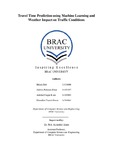| dc.contributor.advisor | Alam, Dr. Md. Ashraful | |
| dc.contributor.author | Deb, Bilash | |
| dc.contributor.author | Khan, Salehin Rahman | |
| dc.contributor.author | Khan, Ashikul Haque | |
| dc.contributor.author | Hasan, Khandker Tanvir | |
| dc.date.accessioned | 2018-11-06T09:54:23Z | |
| dc.date.available | 2018-11-06T09:54:23Z | |
| dc.date.copyright | 2018 | |
| dc.date.issued | 2018 | |
| dc.identifier.other | ID 13310009 | |
| dc.identifier.other | ID 14101197 | |
| dc.identifier.other | ID 14101001 | |
| dc.identifier.other | ID 14201061 | |
| dc.identifier.uri | http://hdl.handle.net/10361/10818 | |
| dc.description | This thesis is submitted in partial fulfilment of the requirements for the degree of Bachelor of Science in Computer Science and Engineering, 2018. | en_US |
| dc.description | Cataloged from PDF version of thesis. | |
| dc.description | Includes bibliographical references (pages 25-26). | |
| dc.description.abstract | The growth of Intelligent Traffic System (ITS) have recently been quite fast and impressive. Analysis and prediction of network traffic has become a priority in day to day planning in social, economic and more widespread set of areas. With a vision to further contribute to this vast field of research, we propose an approach to forecast level of traffic congestion on the basis of a time series analysis of collected data using machine learning. Moreover, the proposed approach allows us to find a correlation between varying parameter of weather and level of traffic congestion. Traffic data collected from Uber Movement for the city of Mumbai, India was fed to multiple of pre assessed machine learning algorithm. We have then analyzed the results of the different machine learning algorithms and see which algorithm efficiently provides us with the optimum accuracy of the prediction which is 85%. Thus, in this study, we attempt to find new knowledge between traffic congestion and weather by using big data processing technology. Changes in traffic congestion due to the weather is evaluated to create a long term prediction model and forecast traffic congestion on a daily basis. Hence a new prediction model that is an extension of the time-varying prediction model has been proposed as the part of this thesis that incorporates the change of occupancy caused due to weather conditions. | en_US |
| dc.description.statementofresponsibility | Bilash Deb | |
| dc.description.statementofresponsibility | Salehin Rahman Khan | |
| dc.description.statementofresponsibility | Ashikul Haque Khan | |
| dc.description.statementofresponsibility | Khandker Tanvir Hasan | |
| dc.format.extent | 26 pages | |
| dc.language.iso | en | en_US |
| dc.publisher | BRAC University | en_US |
| dc.rights | BRAC University theses are protected by copyright. They may be viewed from this source for any purpose, but reproduction or distribution in any format is prohibited without written permission. | |
| dc.subject | Machine learning | en_US |
| dc.subject | Traffic congestion | en_US |
| dc.subject | Forecasting | en_US |
| dc.subject | Weather | en_US |
| dc.subject | Intelligent Transport System | en_US |
| dc.subject | Support Vector Machine | en_US |
| dc.subject | Linear regression | en_US |
| dc.subject | Correlation | en_US |
| dc.subject.lcsh | Traffic engineering--Bangladesh. | |
| dc.title | Travel time prediction using machine learning and weather impact on traffic conditions | en_US |
| dc.type | Thesis | en_US |
| dc.contributor.department | Department of Computer Science and Engineering, BRAC University | |
| dc.description.degree | B. Computer Science and Engineering | |

